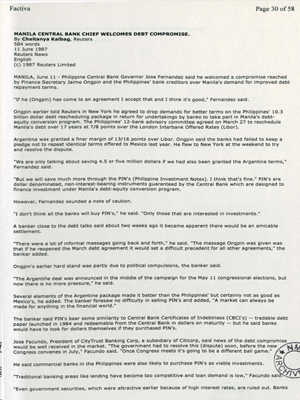MANILA CENTRAL BANK CHIEF WELCOMES DEBT COMPROMISE
[Reuters]
Published date: 11th Jun 1987
11 June 1987
Reuters News
English
(c) 1987 Reuters Limited
MANILA, June 11 – Philippine Central Bank Governor Jose Fernandez said he welcomed a compromise reached by Finance Secretary Jaime Ongpin and the Philippines’ bank creditors over Manila’s demand for improved debt repayment terms.
“If he (Ongpin) has come to an agreement I accept that and I think it’s good,” Fernandez said.
Ongpin earlier told Reuters in New York he agreed to drop demands for better terms on the Philippines’ 10.3 billion dollar debt rescheduling package In return for undertakings by banks to take part in Manila’s debt- equity conversion program. The Philippines’ 12-bank advisory committee agreed on March 27 to reschedule Manila’s debt over 17 years at 7/8 points over the London Interbank Offered Rates (Libor).
Argentina was granted a finer margin of 13/16 points over Libor. Ongpin said the banks had failed to keep a pledge not to repeat identical terms offered to Mexico last year. He flew to New York at the weekend to try and resolve the dispute.
“We are only talking about saving 4.5 or five million dollars if we had also been granted the Argentine terms,” Fernandez said.
“But we will save much more through the PIN’s (Philippine Investment Notes). I think that’s fine.” PIN’s are dollar denominated, non-interest-bearing instruments guaranteed by the Central Bank which are designed to finance investment under Manila’s debt-equity conversion program.
However, Fernandez sounded a note of caution.
“I don’t think all the banks will buy PIN’s,” he said. “Only those that are interested in Investments.”
A banker close to the debt talks said about two weeks ago It became apparent there would be an amicable settlement.
“There were a lot of informal messages going back and forth,” he said. “The message Ongpin was given was that if he reopened the March debt agreement it would set a difficult precedent for all other agreements,” the banker added.
Ongpin’s earlier hard stand was partly due to political compulsions, the banker said.
“The Argentine deal was announced in the middle of the campaign for the May 11 congressional elections, but now there is no more pressure,” he said.
Several elements of the Argentine package made it better than the Philippines’ but certainly not as good as Mexico’s, he added. The banker foresaw no difficulty in selling PIN’s and added, “A market can always be made for anything in the financial world.”
The banker said PIN’s bear some similarity to Central Bank Certificates of Indebtness (CBCI’s) — tradable debt paper launched in 1984 and redeemable from the Central Bank in dollars on maturity — but he said banks would have to look for dollars themselves if they purchased PIN’s.
Jose Facundo, President of CityTrust Banking Corp, a subsidiary of Citicorp, said news of the debt compromise would be well received in the market. “The government had to resolve this (dispute) soon, before the new Congress convenes in July,” Facundo said. “Once Congress meets it’s going to be a different ball game.”
He said commercial banks in the Philippines were also likely to purchase PIN’s as viable investments.
“Traditional banking areas like lending have become too competitive and loan demand is low,” Facundo said.
“Even government securities, which were attractive earlier because of high Interest rates, are ruled out. Banks
are therefore forced to look at any other area which could generate earnings.”






